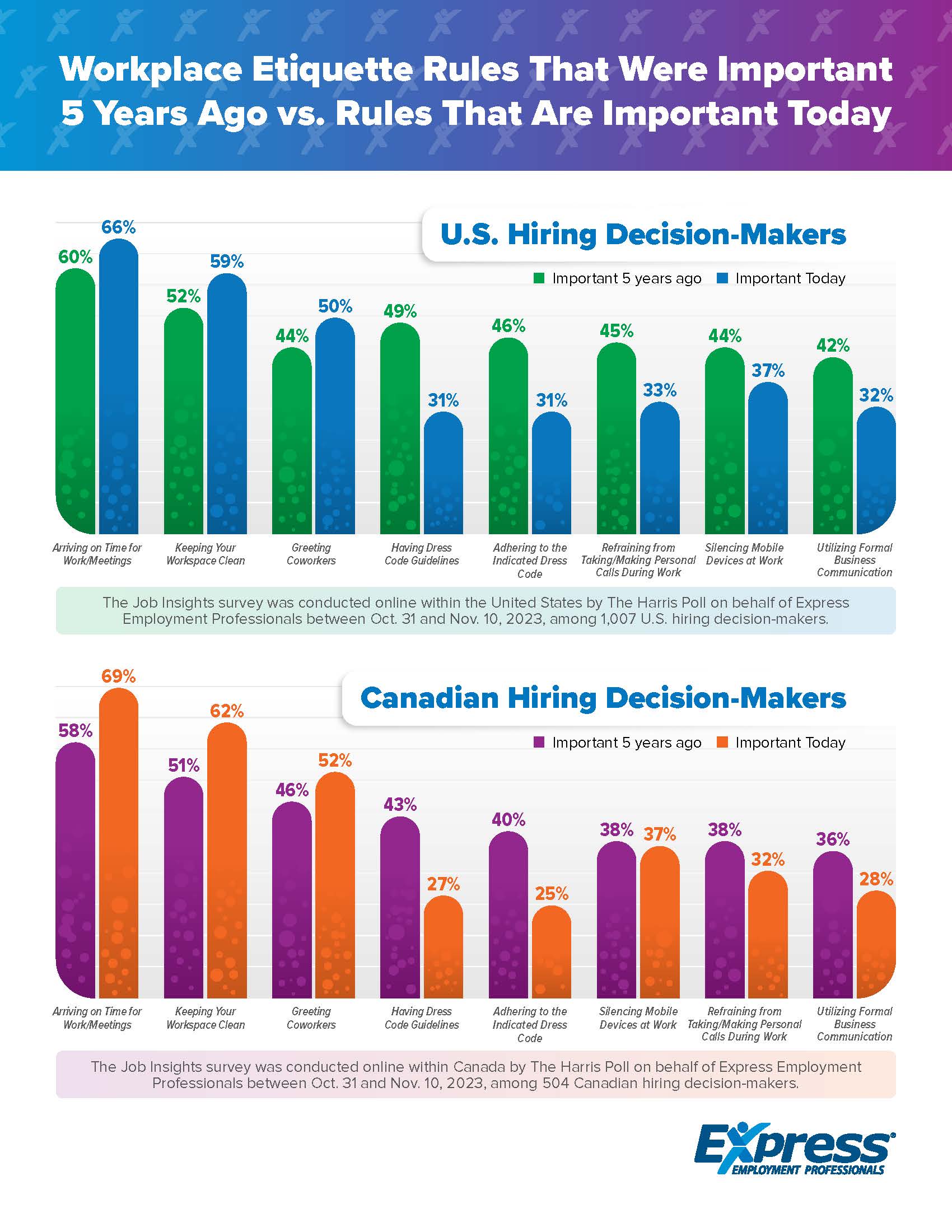
Company culture and workplace etiquette have evolved. Expectations for following dress code guidelines, avoiding personal calls at work, and using formal business communication have subsided in favor of priorities to greet coworkers, arrive to work on time, and keep one’s workspace clean. These shifting expectations are coupled with a new emphasis on positive company culture, according to a recent Express Employment Professionals-Harris Poll survey.
U.S. and Canadian hiring decision-makers are generally in agreement on which etiquette priorities have lessened and which have become important in the workplace today. The formality once required in office culture is no longer valued to the same extent, but still has a place in select industries and company cultures. About half (51%) of U.S. and Canadian hiring decision-makers say it is confusing for employees to know what is and is not acceptable workplace etiquette because so much has changed.

What Makes a Good Company Culture?
What employees want from work and the company culture they desire have also changed. At its core, company culture is comprised of the values, attitudes, behaviors, and standards of a workplace and its employees. Culture is specific and customizable to a company’s values, and a strong one is a critical part of employees’ careers and work-life balance. According to Great Place To Work, there are eight elements to great culture:
- Credibility
- Respect
- Fairness
- Pride
- Belonging
- Effective Leadership
- Values
- Innovation
Hiring decision-makers in the U.S. and Canada understand the importance, as 87% of U.S. and 85% of Canadian hiring decision-makers believe in maintaining a strong company culture, according to the Express Employment Professionals-Harris Poll survey. Most U.S. companies (91%) report their culture as positive, however, 48% describe the culture using negative terms like challenging (27%) and stressful (17%).
For Canadian companies, 89% say their culture is positive and describe it as respectful (47%), welcoming (47%), and flexible (45%). However, not all companies are hitting the target, as 49% report their company culture is negative, describing it as challenging (31%) and stressful (18%).
It appears companies are investing in their culture, as 45% of U.S. and 35% of Canadian hiring decision-makers say their company culture has improved over the past year. They attribute this to hosting more events (in-person and remotely), providing employee recognition, celebrating more milestones, prioritizing diversity, equity, inclusion, and belonging, and emphasizing mental health.
How do you view the culture at your company? What changes could improve the experience for employees? Share your perspective in the comments section below.
To provide accurate and timely employment forecasts for business leaders, Express Employment Professionals commissions an ongoing Job Insights survey to track employment and hiring trends across a wide range of industries.
The Job Insights survey was conducted online within the United States by The Harris Poll on behalf of Express Employment Professionals between Oct. 31 and Nov. 10, 2023, among 1,007 U.S. hiring decision-makers. The Job Insights survey was conducted online within Canada by The Harris Poll on behalf of Express Employment Professionals between Oct. 31 and Nov. 10, 2023, among 504 Canadian hiring decision-makers.
Last Updated on October 30, 2024